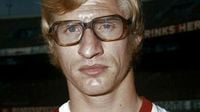In a somber moment for the football community, Feyenoord legend Joop van Daele has passed away at the age of 77. Known for his iconic role in the club's history, Van Daele was a key player in the 1970 World Cup victory, where he scored a memorable goal that secured Feyenoord's place in football lore.
Born on August 14, 1947, in Rotterdam, Van Daele grew up in the shadow of De Kuip, where he first played for the amateur club Overmaas before joining Feyenoord at just 13 years old. His journey through the ranks of the club began in 1960, and he made his debut for the first team in the 1967/68 season. Throughout his career, he played in various positions, earning the nickname "De Lange" (The Tall One) for his height.
Van Daele's most significant contribution came during the World Cup final against Estudiantes from Argentina on September 9, 1970. After a 2-2 draw in the first leg, the pressure was on Feyenoord to secure a victory at home. Van Daele, who started the match on the bench, was brought on as a substitute for Coen Moulijn and made an immediate impact. In the 65th minute, he scored the only goal of the match from 20 meters out, sending the home crowd into a frenzy.
However, the celebration was marred by an unsportsmanlike incident. Following his goal, Van Daele's glasses were seized by Argentine player Oscar Malbernat and subsequently broken by Carlos Pachamé. The incident became a part of the match's lore, with Van Daele's broken glasses now a treasured exhibit in the Feyenoord museum. The story of the glasses has even inspired a song, "Het brilletje van Van Daele," written by Toon Hermans and sung by Luc Lutz.
Despite not being a regular starter, Van Daele was highly regarded by his coaches and teammates. Renowned manager Ernst Happel praised him, saying, "Joop van Daele can be deployed anywhere." His versatility on the field made him a valuable asset to the team.
After his time at Feyenoord, which lasted until 1977, Van Daele played for several other clubs, including Go Ahead Eagles, Fortuna Sittard, and Excelsior. He also took on coaching roles at Excelsior, where he served as both an assistant and head coach.
In a statement, Feyenoord expressed their deep sorrow over Van Daele's passing, extending condolences to his family and loved ones. The club has requested that players wear black armbands during their upcoming match against PSV on May 11, 2025, in honor of the late legend.
Reflecting on his illustrious career, Van Daele once remarked, "I am very proud to be a part of the history of this fantastic club. No one can take that away from me." His contributions to Feyenoord and Dutch football will be remembered fondly by fans and players alike.
In a poignant moment, 50 years after winning the World Cup, Van Daele held the trophy once again at the Feyenoord Museum, reminiscing about the weight of the cup and the memories it encapsulated. "I didn't realize how heavy this thing was," he said, highlighting the lasting impact of that historic victory.
Joop van Daele's legacy transcends statistics; it is woven into the very fabric of Feyenoord's history. His remarkable goal, the story of his broken glasses, and his unwavering loyalty to the club will forever resonate with fans. As the football world mourns his loss, it celebrates the life of a true icon who left an indelible mark on the sport.
Van Daele's passing reminds us of the fragility of life and the enduring spirit of sportsmanship. His journey from a young boy playing in the streets of Rotterdam to a celebrated footballer and coach serves as an inspiration to many. As we reflect on his achievements, we honor not just the player but the man who embodied the heart and soul of Feyenoord.
In closing, the football community stands united in remembrance of Joop van Daele, a true legend whose contributions to the game will never be forgotten. His story is one of passion, perseverance, and pride, and it will continue to inspire future generations of players and fans alike.





